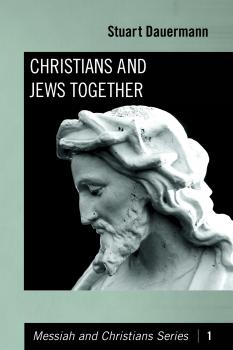ТОП просматриваемых книг сайта:
Stuart Dauermann
Список книг автора Stuart DauermannАннотация
In Keeping the Faith in Interfaith Relationships, Stuart Dauermann calls for a reconsideration of the long held assumption that a Jew who believes in Jesus exits from Jewish life. Dauermann represents Jesus, not as an exit, but as an entrance into more serious engagement with Jewish life. The implications of this perspective for interfaith couples, both Christians and Jews, are profound.
Аннотация
While all have reason to celebrate the greening of Christian-Jewish relations since the Shoah and the promulgation of Nostra Aetate (4), few will deny that much work remains to be done by Christians and Jews seeking the best way forward that they might best serve God's purposes in the world, the mission of God. This book addresses that need by first surveying how each community has historically conceived of its own mission and from that stance assigned an identity to the other. The text illuminates how such construals have often impeded progress and therefore need to be upgraded and supplemented. But how shall this be done? Converging Destinies proposes an eschatological vision and practical suggestions to summon Jews and Christians to prepare for that day when each will be both commended and reproved by the judge of all, sounding a call for more determined action, greater humility, and cooperative effort as together Jews and Christians serve the mission of God, accountable to him for how they have served him and each other in the world that he has created according to his will.
Аннотация
"There are many aspects to this task of rabbinic training, but four closely related questions rise to the surface as requiring primary attention. The first is a question of description: What ought to be the functions performed by a messianic Jewish rabbi? The second is a question of legitimacy: What similarities exist between the functions performed by messianic Jewish rabbis and rabbis in the wider Jewish context such that the rabbinate in both contexts may legitimately be seen to be variations on the same theme, and the messianic Jewish rabbinate therefore legitimately a rabbinate? The third is a question of differentiation: How and why are the functions performed by a messianic Jewish rabbi contextually particularistic and therefore different from those performed byChristian clergy? In other words, how is a messianic rabbi more than just a Protestant Pastor with switched labels? The fourth is a question of biblicity: Is there biblical justification or precedent for the proposed paradigm of the rabbi as a surrogate priest? Each of these questions emerges from messianic Judaism's interaction with different but overlapping audiences. The question of description is addressed primarily to the messianic Jewish context. The question of legitimacy is addressed primarily to the wider Jewish world. The question of differentiation is addressed primarily to the church world. The question of biblicity is addressed both to the messianic Jewish context and the church world. And in all cases, looking over our shoulder is the general public." –from the Prologue
Аннотация
In Christians and Jews Together, Stuart Dauermann challenges Christians and Jews to discover new ways to partner together in serving what God is up to in the world. He imaginatively connects the thinking of Paul the Apostle with the Prophet Ezekiel, forming a previously unexplored bridge between Jews and Christians. This is an excellent resource for Christians seeking new ways to understand and share their faith within the context of deep respect for their Jewish neighbors, relatives, and friends.




